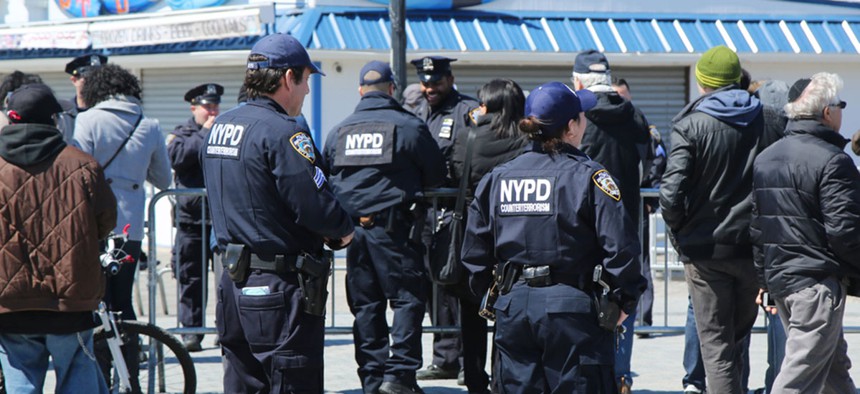
Leonard Zhukovsky / Shutterstock.com
Americans Are More Worried About Terrorism Than They Were After 9/11
Fears about terrorism have risen considerably in the U.S., but that has a lot to do with which party is in the White House.
In 2002, with the footage of collapsing World Trade Centers still fresh in American minds, the pollsters at Pew Research posed a question. “Do you think the ability of terrorists to launch another major attack on the U.S.,” they asked, “is greater, the same, or less than it was at the time of the September 11th terrorist attacks?”
A slim plurality of respondents, 39 percent, said nothing had changed in the past year. A third allowed that things had gotten better. The rest—22 percent—said America was actually less safe, despite the billions spent on a military incursion into Afghanistan and the creation of an entire new cabinet-level department devoted to homeland security.
It turns out 2002 was a relatively optimistic year. According to Pew’s latest figures, 40 percent of Americans now believe the country is more vulnerable to terrorism than it was in 2001, the highest ever. Republicans lead that charge: More than half think terrorists have grown stronger, while only a third of Democrats agree. And if the GOP is scared, Donald Trump is there to help—or rile things up. “If we don’t get tough, and if we don’t get smart, and fast, we’re not going to have our country anymore,” he said in June, following the mass shooting at a nightclub in Orlando. “There will be nothing—absolutely nothing—left.”
But are Republicans really worried about terrorism? I had my suspicions. Here’s why:
It turns out Americans’ sense of security is tied to partisan identification. Democrats were the pessimistic party for most of the last decade. Republicans, on the other hand, were fairly confident in the country’s security. But as soon as Barack Obama took office, the polarity flipped; Republican discomfort soared, and Democrats suddenly felt a lot safer. Looking at these figures, it seems each side’s sense of security tracks more closely to whether their guy is sitting in the Oval Office, rather than any empiric judgement about the state of the world.
“Republicans are expressing doubts about the ability of the country to handle a terrorist attack under a Democratic president,” said Jocelyn Kiley, associate director of research at Pew. “It reflects confidence in the commander-in-chief—it’s not really a surprise that there’s a flip here.”
The parties haven’t changed their minds on the tradeoffs of national security, where they sharply diverge. For years, Democratic respondents have said they care more about making sure anti-terrorism policies don’t restrict civil liberties, while Republicans maintain the government hasn’t done enough to protect the U.S. These two trendlines briefly converged in 2013, when pretty much everyone freaked out over government intrusion after documents leaked by Edward Snowden became public. Besides that, the two parties have followed the same predictable paths. Viewed in that light, Pew’s recent findings don’t seem that remarkable.
But researchers are alarmed—not by the presence of the divide, which will probably always exist, but the degree. Kiley thinks the gap between Democrats and Republicans on security has grown so large that it can’t be explained by presidential preference alone.
“It’s not simply that Republicans are skeptical about Obama’s handling of terrorism in the same way Democrats were worried about Bush,” she said. This marks the first year in the survey’s history that a majority of either party thinks terrorists have the upper hand. And only 29 percent of Republicans think the government is doing a good job in reducing the threat of terrorism, compared to 75 percent of Democrats.
Part of the GOP’s concern about security is definitely linked to their distrust of Obama. Maybe even most of it. But Republican voters are reporting enough discomfort to indicate genuine fear. It’s that kind of fear that makes people think crime is going up, even when it’s going down, or that immigrants threaten national security, when researchers agree they don’t.
Trump’s success, then, is a chicken-or-egg question. Did he sense growing disquiet and offer solutions? Or have his dire predictions made everything seem worse? The answer, like your sense of safety, probably depends on your party registration.






